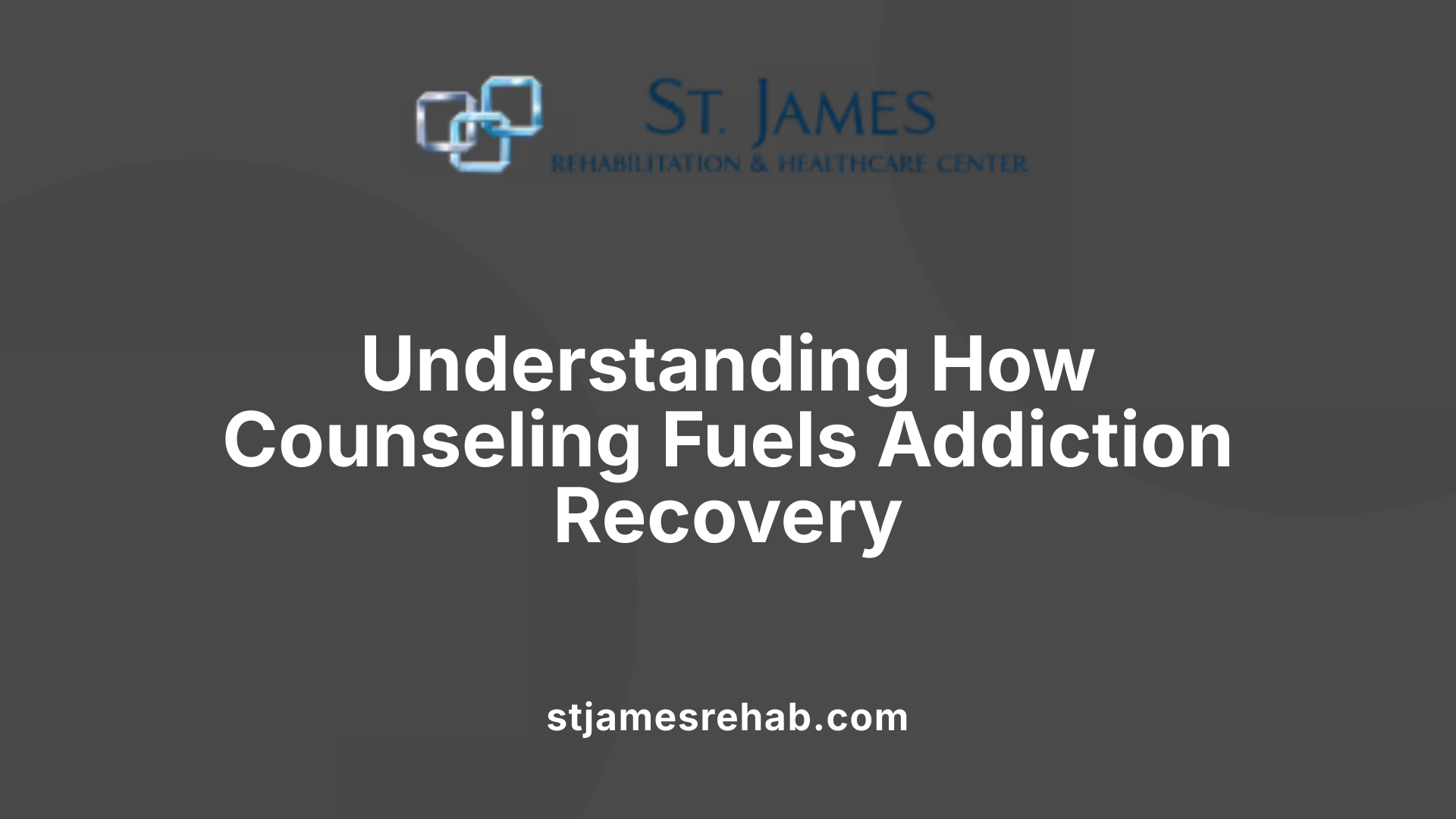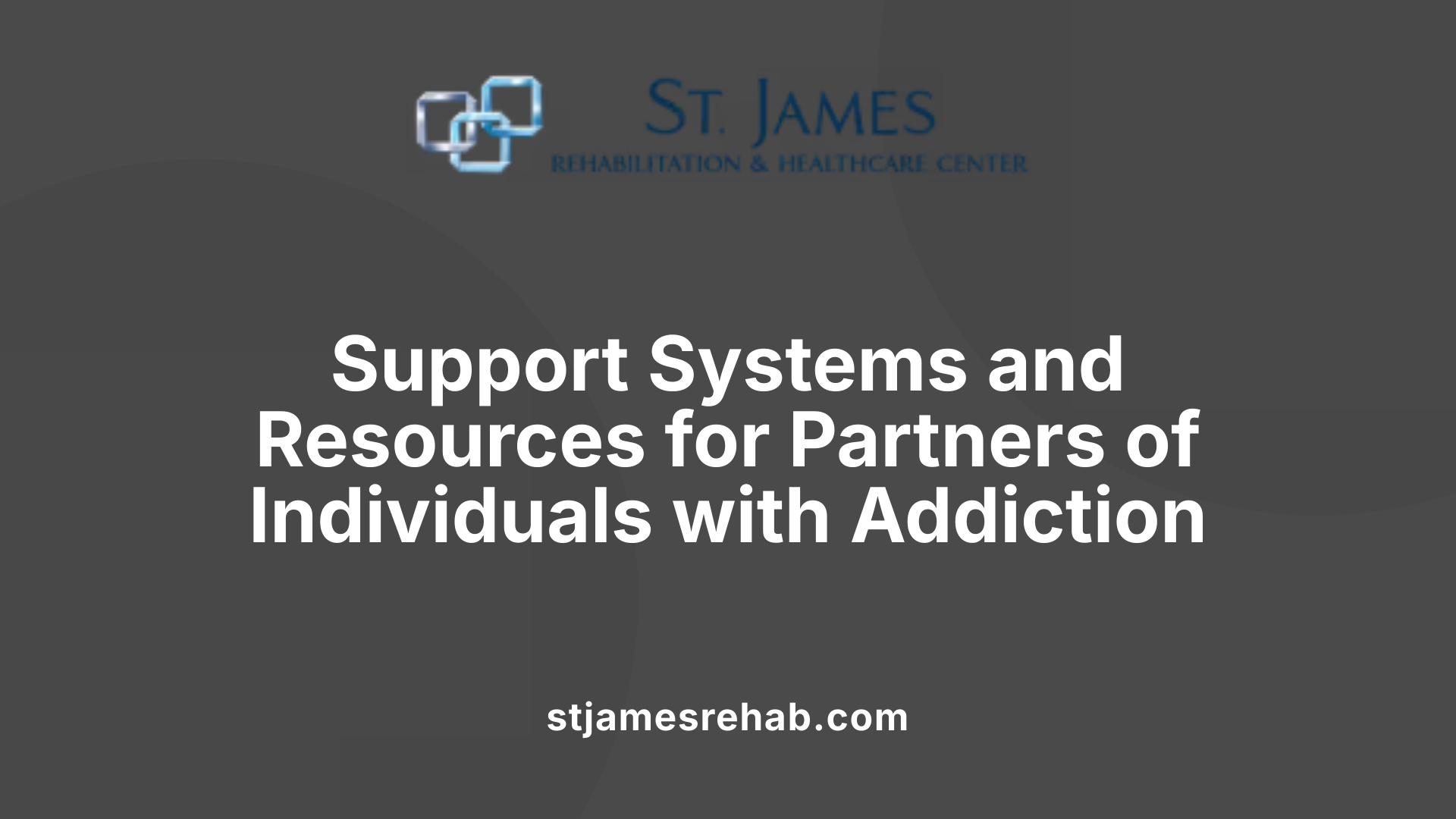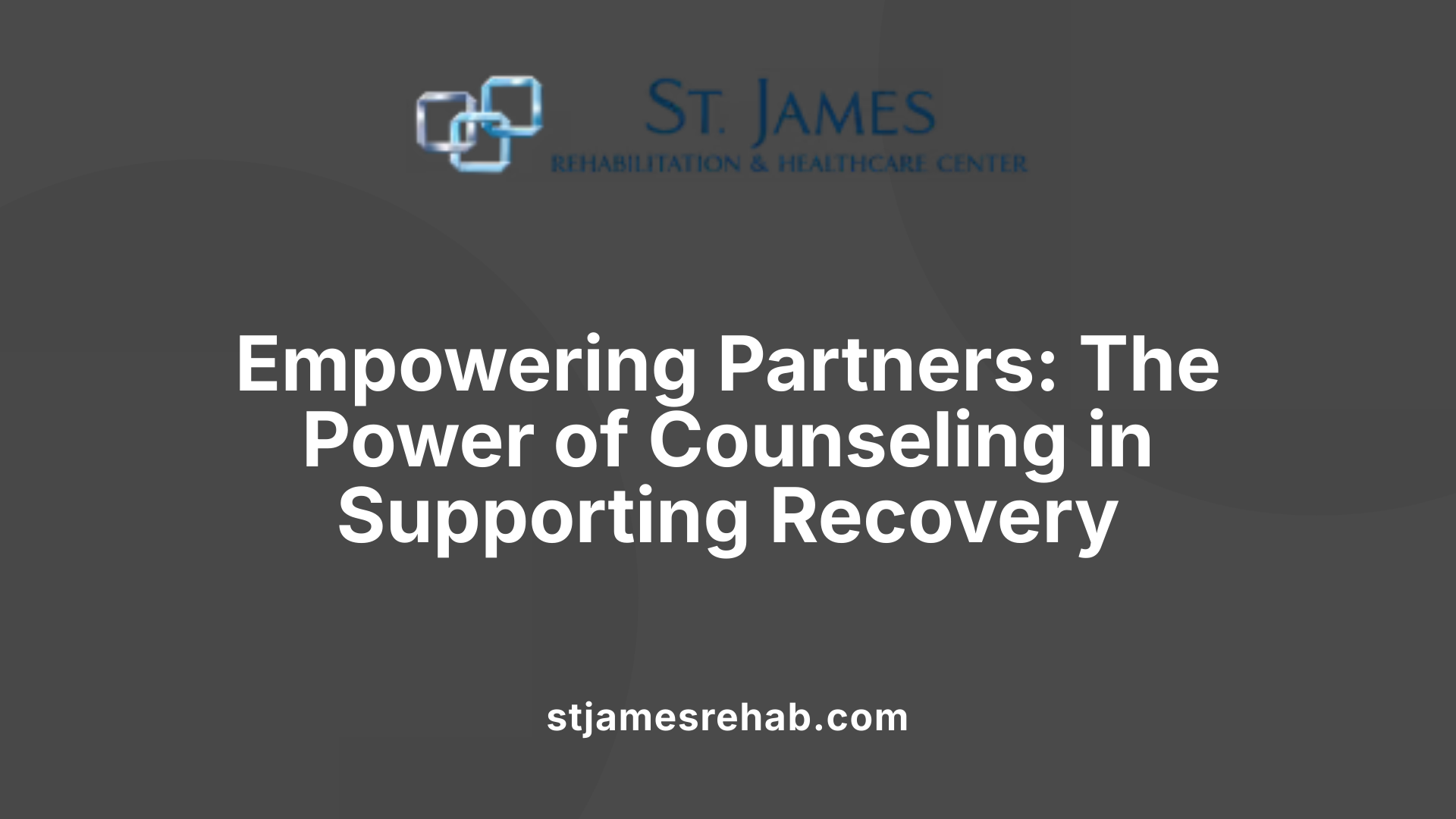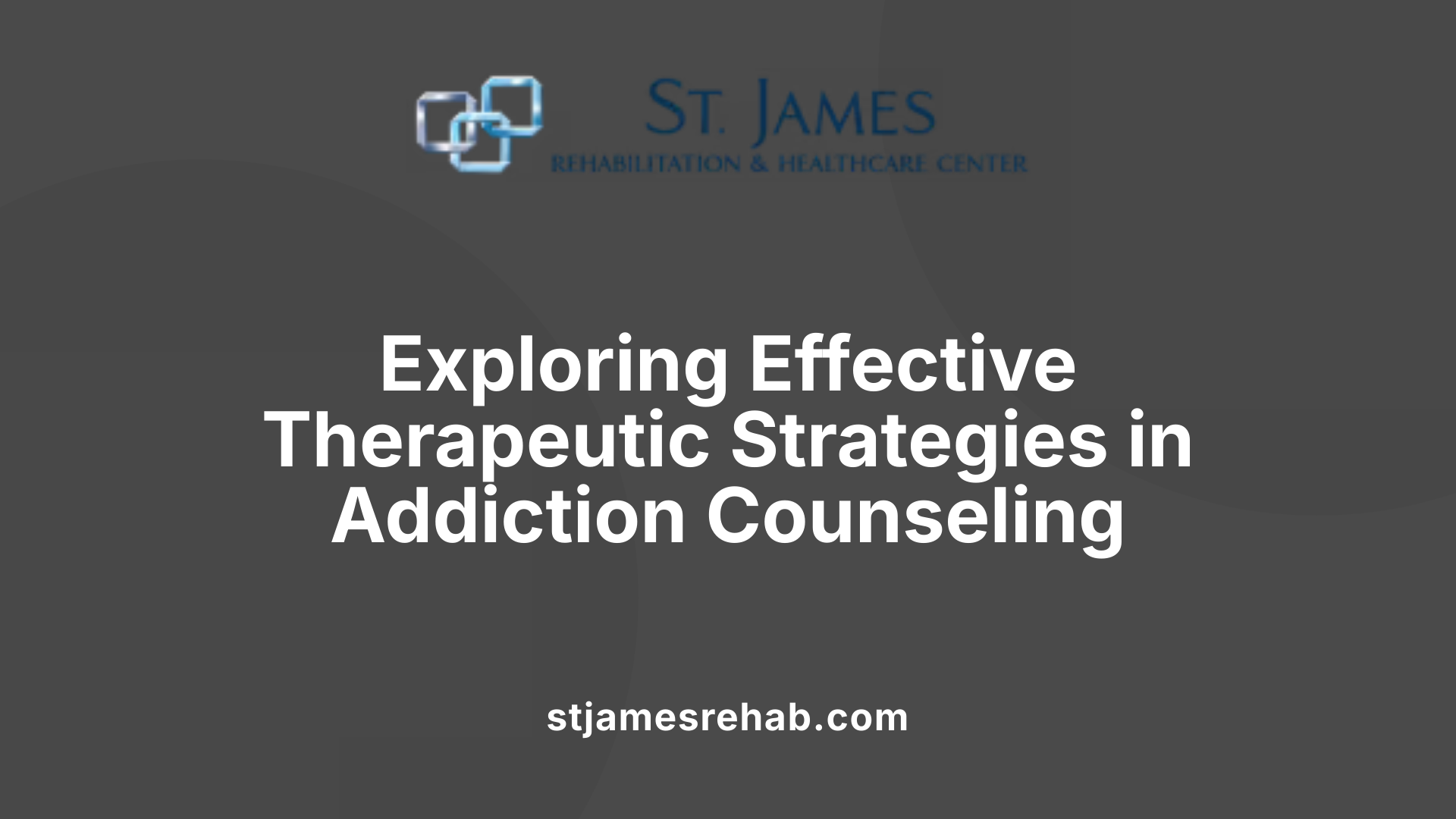The Importance of Counseling for Partners of Addicts
Supporting Loved Ones Through Courtship and Healing

Understanding the Critical Role of Counseling in Addiction Recovery
Addiction not only impacts individuals but also profoundly affects their partners and family members. Counseling emerges as an essential support mechanism, fostering recovery, addressing relational damage, and laying the groundwork for long-term healing. This article explores the multifaceted benefits of counseling for partners of addicts, highlighting therapeutic approaches, strategies, and resources designed to enhance mental health, strengthen relationships, and facilitate a resilient recovery process.
Foundations of Counseling and Family Therapy in Addiction Recovery

How does counseling support recovery and healing in the context of addiction?
Counseling is a vital component in the journey toward recovery from addiction. It helps individuals uncover and address the psychological and emotional roots of their substance use, such as trauma, mental health issues, or self-esteem challenges. Through a supportive and professional environment, counseling equips patients with effective coping strategies to manage stress, triggers, and cravings.
Various therapeutic approaches—such as group therapy, family counseling, and behavioral therapies—create a network of support, fostering accountability and motivation for change. Family involvement, including education on addiction’s nature, bolsters understanding and compassion, which are crucial in healing relational wounds.
Support groups like Alcoholics Anonymous (AA) or Narcotics Anonymous (NA) offer additional community-based reinforcement, providing ongoing encouragement and shared experiences. Together, these interventions form a comprehensive framework that sustains long-term sobriety, supports emotional resilience, and promotes holistic recovery.
Why is therapeutic intervention important for relationships affected by addiction?
Addiction impacts relationships by creating emotional upheaval, trust issues, and conflicts over responsibilities. Therapeutic intervention provides essential support for healing these relational scars.
Family therapy and couples counseling, rooted in systems theory, aim to improve communication, resolve conflicts, and rebuild trust. These therapies help identify dysfunctional patterns that sustain addiction, like enabling behaviors or codependency, and introduce healthier interactional skills.
Involving family members and partners in treatment enhances the support network, encourages shared accountability, and reduces the likelihood of relapse. Therapy also offers a safe space to explore emotional distress, address trauma, and confront underlying issues—factors that often hinder sustained recovery.
Overall, professional-guided therapy not only aids the individual in maintaining sobriety but also strengthens the relational fabric, creating conditions for a more durable and supportive recovery environment.
How can a strong therapeutic relationship improve treatment outcomes for partners of addicts?
A strong therapeutic relationship is fundamental to successful treatment outcomes. Trust, empathy, and open communication within the therapist-client alliance encourage greater engagement and commitment to the recovery process.
When partners of addicts feel understood and valued, they are more likely to actively participate in therapy sessions, share concerns, and implement recommended strategies at home. This collaborative bond fosters insight into underlying relational issues, enhances emotional support, and boosts motivation.
Importantly, a positive therapeutic alliance can reduce treatment dropout rates and increase client satisfaction. Therapists can also effectively facilitate healing by addressing ruptures or misunderstandings within the relationship, reinforcing a sense of safety and mutual respect.
Ultimately, cultivating a robust relationship with the therapist not only improves adherence to treatment but also empowers partners to develop resilience, healthy coping skills, and a renewed sense of trust—critical elements for achieving long-term recovery.
Types of therapeutic approaches used in addiction counseling
| Therapy Type | Description | Benefits |
|---|---|---|
| Behavioral Couples Therapy (BCT) | Focuses on improving relationship dynamics, promoting abstinence, and addressing enabling behaviors | Greater reduction in substance use, improved relationship satisfaction |
| Family Therapy | Engages the entire family to improve communication, address codependency, and support recovery | Supports systemic change, reduces relapse risk, heals family bonds |
| Group Counseling | Provides peer support and shared experiences, fostering community | Emotional support, motivation, accountability |
| Motivational Interviewing | Helps resolve ambivalence, enhances motivation to change | Increases readiness for change, short-term reduction in use |
| Cognitive Behavioral Therapy (CBT) | Targets thought patterns and behaviors linked to substance use | Develops coping skills, identifies triggers, reduces relapse |
| Trauma-Informed Therapy | Ensures safety and trust, addresses past trauma contributing to addiction | Supports emotional healing, builds resilience |
The role of licensed therapists and creating a supportive environment
Licensed family therapists and marriage counselors play a crucial role in guiding individuals and couples through the complexities of addiction recovery. They are trained to recognize the multifaceted nature of addiction, including relational, psychological, and environmental factors.
A supportive therapy environment is characterized by safety, confidentiality, and empathy. Therapists foster trust and collaboration, making it easier for clients to openly discuss sensitive issues.
They utilize tailored approaches, adapt to cultural and individual differences, and oversee progress through measurable goals. Such a setting encourages honest communication, reduces stigma, and strengthens the therapeutic alliance.
In addition, therapists assist in developing relapse prevention plans, addressing underlying mental health issues, and involving families or support groups to reinforce the recovery process. Their expert guidance ensures that treatment is both effective and sustainable.
Strategies and Resources Supporting Partners of Addicts

What strategies and resources are available to support partners of addicts?
Partners of individuals struggling with addiction face numerous challenges that require comprehensive support. Various strategies and resources can aid them in coping, supporting recovery, and maintaining their own well-being.
Support groups like Al-Anon, Nar-Anon, and Recovering Couples Anonymous are vital community resources. These peer-led groups provide a safe space for sharing experiences, gaining emotional support, and learning coping skills. They emphasize that addiction is a disease and offer encouragement through understanding that partners are not alone in their journey.
Education about addiction is another crucial resource. Partners who understand the nature of addiction, including its neurological and psychological aspects, can better support their loved ones. Resources like the Substance Abuse and Mental Health Services Administration (SAMHSA) offer free, confidential helplines and referrals to local treatment centers, community programs, and support networks. These support systems often operate on sliding fee scales or accept insurance, making access more affordable.
Professional support through individual counseling and family therapy plays a significant role. Individual counseling helps partners address their emotional responses, set boundaries, and practice self-care. Family therapy involves the whole family system, aiming to improve communication, resolve conflicts, and support collective healing. Behavioral Couples Therapy (BCT) is particularly effective by focusing on relationship dynamics that influence addiction and recovery.
Practical steps for partners include setting clear boundaries to prevent enabling behaviors, which might include financial support or covering for the addicted individual. Practicing self-care—through regular exercise, hobbies, or therapy—is vital to maintain mental health.
Involving community resources such as local support groups, outpatient programs, and educational workshops further strengthens the partner’s ability to support their loved one while safeguarding their own well-being. Overall, combining emotional support, education, professional intervention, and community engagement creates a robust framework for partners to navigate the complex journey of addiction recovery.
The benefits of counseling and family therapy for partners of addicts
Counseling and family therapy provide profound benefits for partners dealing with addiction in loved ones. These therapeutic approaches address the emotional and relational impacts of addiction, which often include feelings of guilt, frustration, betrayal, and helplessness.
Through counseling, partners learn to recognize enabling behaviors—such as making excuses or taking over responsibilities—that unintentionally sustain the addiction cycle. Therapy helps them develop healthier communication patterns and establish boundaries that protect their emotional health.
Family therapy extends these benefits to the entire family system. It encourages open dialogue, fosters understanding of addiction as a disease, and educates about the importance of mutual support. Engaging family members in therapy enhances trust, rebuilds relationships strained by addiction, and creates a united front supporting recovery.
Furthermore, therapy boosts resilience by providing coping strategies and emotional regulation techniques, reducing the risk of burnout and depression among partners. Studies consistently show that involving partners and family members in treatment increases treatment adherence, lowers relapse rates, and promotes sustained recovery.
In conclusion, counseling and family therapy are indispensable in helping partners of addicts navigate their complex emotional landscape, improve relationships, and foster an environment conducive to recovery.
The Benefits of Counseling and Family Therapy for Partners of Addicts

What are the benefits of counseling and family therapy for partners of addicts?
Counseling and family therapy provide crucial support for partners of those struggling with addiction. These therapeutic approaches help address the relational and behavioral issues often caused by substance use, such as broken trust, poor communication, and enabling behaviors.
Partner therapy, a form of behavioral couples therapy, specifically focuses on improving relationship dynamics, reducing enabling actions like making excuses or covering for the addicted partner, and fostering emotional support. This not only strengthens the couple’s bond but also enhances treatment outcomes for the person with addiction.
Family counseling is equally vital, as it creates a supportive environment for healing. It educates family members about addiction, helping them understand the disease rather than viewing it as personal failure. This understanding promotes empathy, improves communication, and helps resolve conflicts.
Engaging family members and partners improves treatment engagement, making recovery more sustainable. It reduces the risk of relapse by strengthening the collective support system. Overall, these therapies facilitate long-term recovery, rebuild trust, and restore emotional well-being among loved ones.
Why is counseling essential for mental health during recovery?
Counseling plays a pivotal role in sustaining mental health throughout the recovery process. Addiction often leaves individuals grappling with feelings of guilt, shame, and low self-esteem. Therapy provides a safe environment to explore these emotions, work through trauma, and develop resilience.
Professional counselors help individuals recognize triggers and develop coping strategies to manage stress and emotional upheaval. They guide clients in understanding underlying causes of addiction, including past trauma or mental health issues, which can be addressed concurrently.
Maintaining mental wellness through counseling reduces the likelihood of relapse, as individuals learn healthier ways to handle emotional challenges. It also promotes overall well-being, helping individuals build confidence and emotional strength.
For partners and family members, counseling offers vital support and education about the disorder, fostering compassion and better support strategies. This holistic approach improves the chances of sustained sobriety and helps rebuild broken relationships.
Supporting long-term recovery and relationship stability
Long-term recovery is often reinforced through ongoing therapy and strong support networks. Counseling assists in establishing healthy routines, maintaining motivation, and navigating life’s challenges without substances.
Relationship stability is promoted by addressing core issues such as communication breakdowns, trust erosion, and unresolved emotional pain. Couples therapy, in particular, emphasizes rebuilding trust, practicing effective communication, and healing emotional wounds.
Support groups like Al-Anon or Nar-Anon also contribute by providing community backing, reducing feelings of isolation, and sharing successful strategies. These collective efforts help individuals maintain sobriety, foster healthy relationships, and achieve overall stability.
Rebuilding trust and addressing emotional pain
Addiction often damages trust and causes emotional wounds. Therapy techniques focus on healing these rifts by encouraging honest dialogue and forgiving past hurts.
Counseling helps partners express their feelings, understand each other’s perspectives, and develop empathy. It promotes acknowledgment of enabling behaviors and guides couples in setting boundaries.
Healing emotional pain involves processing grief, disappointment, and betrayal, enabling couples to move forward. Trust is gradually rebuilt through consistent, transparent actions and reinforced commitment.
Involving family and support networks for holistic healing
Successful recovery benefits from involving a broader support system. Family and community networks provide additional emotional backing and accountability.
Support groups such as Al-Anon and family therapy sessions teach family members how to support their loved ones effectively. They also educate about addiction’s impact, helping to dispel myths and reduce stigma.
This holistic approach ensures that emotional, psychological, and social needs are met, creating a resilient environment for sustained recovery.
| Aspect | Focus | Benefits |
|---|---|---|
| Relationship Dynamics | Improving communication, trust rebuilding | Strengthened bonds, healthier interactions |
| Emotional Support | Processing pain, fostering resilience | Better emotional health, reduced guilt |
| Family Involvement | Education, support, boundary setting | Increased treatment adherence, collective healing |
| Long-term Stability | Continual therapy, support groups | Reduced relapse risk, sustained sobriety |
By integrating counseling and family therapy, partners of addicts can experience profound improvements in both their personal well-being and the health of their relationship. These interventions are essential tools on the path toward recovery and emotional resilience, ensuring a supportive environment where healing and long-term stability are achievable.
Therapeutic Approaches and Techniques Used in Counseling for Families and Partners

What therapeutic approaches are used in counseling for families affected by addiction?
Family counseling for addiction primarily emphasizes active involvement of family members to create a supportive environment that fosters recovery. Based on systems theory, these approaches focus on enhancing family dynamics, communication, and interaction patterns. Evidence-based therapies such as Multi-Dimensional Family Therapy (MDFT), Functional Family Therapy (FFT), Brief Strategic Family Therapy (BSFT), and Behavioral Couples Therapy (BCT) are common.
These therapies aim to improve supportive relationships, encourage positive reinforcement, and facilitate behavioral change within the family unit. They incorporate techniques like motivational interviewing, contingency management, and family behavior loop mapping to boost engagement and promote abstinence or harm reduction.
Psychoeducation plays a vital role, providing families with information about addiction and recovery. Support groups such as Al-Anon further help families understand the disease, reduce stress, and develop coping skills.
Overall, integrating family-focused interventions and involving family members in treatment have been shown to significantly improve recovery outcomes, reinforce healthy relationship patterns, and reduce relapse rates.
Which therapeutic approaches are most effective in counseling for addiction recovery?
Effective addiction counseling often combines several approaches tailored to individual needs. Behavioral Couples Therapy (BCT) has shown strong results by addressing dysfunctional patterns while fostering supportive behaviors, thus reducing substance use and increasing relationship satisfaction.
Motivational Interviewing (MI) helps clients resolve ambivalence about change, thereby strengthening their motivation for recovery through collaborative goal-setting.
Cognitive Behavioral Therapy (CBT) explores the thoughts and behaviors that contribute to substance use, teaching coping skills to manage triggers and prevent relapse.
Trauma-Informed Therapy emphasizes creating a safe environment, supporting trauma healing that may underpin addictive behaviors.
Combining these approaches with psychoeducation, ongoing support groups, and family involvement enhances treatment effectiveness, encourages sustained abstinence, and promotes overall well-being.
What techniques are used within counseling to foster recovery and emotional support?
Several key techniques are employed within counseling to support recovery and emotional resilience:
- Communication Skills Training: Helps clients learn to express feelings clearly and listen actively, improving relationships and reducing misunderstandings.
- Boundary Setting: Assists individuals in establishing healthy limits to prevent enabling behaviors and protect their mental health.
- Relapse Prevention Planning: Involves identifying warning signs of relapse and developing strategies to cope with cravings, stress, or environmental triggers.
- Psychoeducation: Educates clients and families about addiction, dispelling myths and fostering understanding to reduce stigma and resistance.
- Group Therapy: Provides peer support, shared experiences, and encouragement, fostering a community of resilience.
These techniques work together to build healthier interpersonal relationships, increase self-efficacy, and establish a stable foundation for long-term recovery.
| Techniques | Description | Benefits |
|---|---|---|
| Communication Skills | Teaching effective expression and active listening | Reduces conflict, enhances understanding |
| Boundary Setting | Establishing healthy personal limits | Prevents enabling behaviors, protects mental health |
| Relapse Prevention Plans | Developing personalized strategies against relapse | Promotes sustained abstinence |
| Psychoeducation | Informing about addiction and recovery process | Builds understanding, reduces stigma |
| Group Support | Peer-based encouragement and shared experiences | Increases motivation and resilience |
The importance of tailoring approaches to individual and family needs
Every individual and family has unique experiences, dynamics, and challenges. Customizing therapy ensures that interventions are relevant and effective. Counselors assess factors such as mental health status, cultural background, family structure, and severity of addiction.
Tailored approaches enable clinicians to address specific issues like trauma, co-occurring disorders, or resistance to change. For example, trauma-informed therapy emphasizes safety and trust, vital for clients with past abuses.
Family therapy may involve adjusting strategies based on family communication styles, cultural values, or readiness to change. Personalized plans enhance engagement, promote adherence, and ultimately improve recovery outcomes.
Role of psychoeducation and ongoing support groups
Psychoeducation empowers clients and families with knowledge about addiction—its causes, consequences, and treatment options. This understanding reduces stigma, dispels misconceptions, and encourages active participation in recovery.
Ongoing support groups like Al-Anon, Nar-Anon, and Recovering Couples Anonymous provide peer-led environments where individuals share experiences, offer mutual support, and reinforce recovery principles. Participation in these groups correlates with increased abstinent days and longer-term sobriety.
Both psychoeducation and support groups serve as vital components in building a comprehensive support network, helping individuals maintain motivation, develop coping skills, and build resilience over the long term.
Building a Future of Support and Recovery
The journey of recovery from addiction is complex and challenging but greatly strengthened through professional counseling and family involvement. By addressing relational wounds, fostering open communication, and enhancing emotional resilience, therapy provides the foundation for lasting change. Support groups and tailored resources empower partners to navigate the recovery process with confidence and hope. Ultimately, the commitment to therapeutic intervention not only aids individuals struggling with addiction but also strengthens the bonds with loved ones, paving the way for a healthier, supportive future for all involved.
References
- Importance Of Partner Therapy | Freedom From Addiction
- Living With Addiction: How to Help a Spouse or Partner | AAC
- Mental Health Coping Resources for Children and Families - SAMHSA
- Five Big Benefits of Counseling in Drug Addiction - Hanley Center
- Family Therapy for Addiction
- Couples Therapy for Addiction: Healing Together
- The importance of therapy during addiction recovery - News
- The Role of the Substance Abuse Counselor in Addiction Recovery
- Substance Abuse and Intimate Relationships - aamft






